List of 15 Best Gut-Friendly Foods

List of 15 Best Gut-Friendly Foods
Posted on 14th May, 2025
Think of gut health as a garden that needs proper care and nourishment to flourish. Just like a garden needs sunlight, water, and good soil, gut health also needs a healthy balance of fibers, probiotics, and prebiotics. A healthy balanced diet consisting of these components, not only improves gut health but also impacts overall health influenced by gut health.
In this article, we have enlisted 20 such gut-friendly foods that will bring back the healthy balance of probiotics and prebiotics and support gut health. Let’s have a look at which foods can help boost your gut health.
1. Curd (Yogurt):
What makes it good for your gut?
Curd, also known as yogurt, is a creamy textured semi-liquid food, which is made by fermenting milk with lactic acid bacteria. Due to the fermentation process, curd contains live bacteria which helps restore the balance of good bacteria in the gut, and is easy to digest. Additionally, curd relieves digestive symptoms like bloating, constipation, and diarrhea, as well as improves lactose digestion.
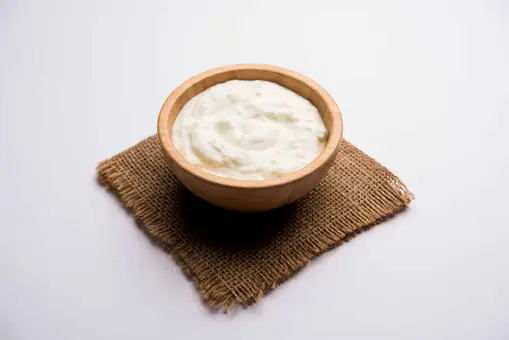
How to include it in your diet?
Curd is an extremely versatile food product, and you can enjoy it plain in a bowl or as a raita with lunch or dinner. It is a good option for breakfast or a protein-rich snack with fresh fruits, nuts, and seeds. Or you can add it as a base in some recipes like rawa idli or as a dip with aloo paratha.
2. Buttermilk (Chaas)
What makes it good for your gut?
Buttermilk is a fermented dairy drink containing live bacteria and is gut-friendly in nature. It is rich in probiotics that help to flourish the gut balance and help break down food more efficiently offering enhanced nutrient absorption. Buttermilk is a traditional drink, known for its cooling effects, digestion improvement qualities, and reducing bloating, gas, and indigestion. In addition, it improves how the gut utilizes nutrients and contributes to weight management.

How to include it in your diet?
It is very convenient to include buttermilk in your diet. Just grab a glass of fresh buttermilk, and drink it after meals. You can add cumin seed powder, crushed ginger, and a pinch of salt to enhance the taste. It is also used to make kadhi in Indian recipes or drink as a snack during hot summer days to support your gut health.
3. Idli & Dosa (Fermented Rice and Lentil Batter)
What makes it good for your gut?
Idli and dosa, both are made from the same batter, made from naturally fermented batter of rice and lentils. This fermented batter contains lactobacillus (a probiotic), which enhances the gut-friendly profile of this food recipe. Due to the fermentation of rice and lentils, the probiotic content increases, as well as it becomes easy for the body to absorb iron. On one hand, idli being soft, is easy to digest, and dosa on the other hand is crispy, providing the same gut-friendly effects, promoting microbial diversity, and enhancing the digestion of carbohydrates and protein.
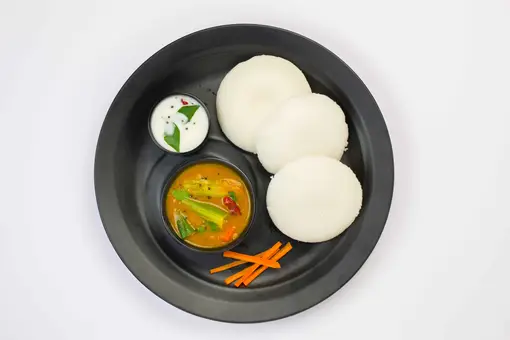
How to include it in your diet?
Idli is made using a steam process, which is light and easy on digestion so one can enjoy it for breakfast or as a light dinner. Using the same batter, one can also make uttapam and dosa, and simply enjoy them with sambhar, coconut, and peanut chutney.
4. Kefir (Fermented Milk Drink)
What makes it good for your gut?
Kefir is also a fermented dairy product made by fermenting milk with the addition of beneficial bacteria and yeast, making it a great fit for gut health improvement. It is quite rich in probiotics, good for enhancing digestion, reducing gut inflammation, and improving gut barrier function. It helps relieve lactose intolerance symptoms, making it easy to digest lactose. It’s a great addition to reducing bloating, gas, and cramps, as well as reducing harmful bacterial growth in the gut microbiome.
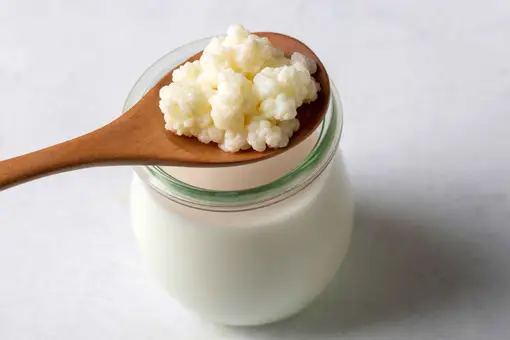
How to include it in your diet?
Kefir is best to drink after a meal or during mid-morning as a smoothie. You can add fruits and seeds to kefir smoothie and make it taste better. Try not to add excessive sugar for maximum benefits.
5. Lassi
What makes it good for your gut?
Lassi is also a dairy-based drink, made using curd, that’s not just refreshing and hydrating, but also super beneficial for gut health and digestion. It is rich in probiotics and supports the growth of good bacteria in the digestive tract, maintaining a healthy balance of gut microbiota. Lassi is a famous drink during the monsoon and summer season when the body is prone to infection, it strengthens the immune system by improving gut health.
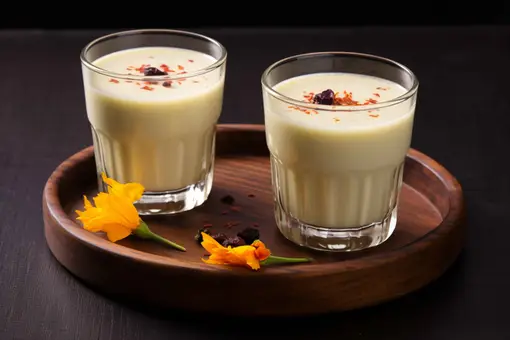
How to include it in your diet?
Lassi can be enjoyed as a salty or sweet-flavored drink. For a salted drink, you can mix cumin seed powder, mint leaves, or ginger to have an enhanced taste. Enjoy a glass of plain or mildly spiced lassi with meals to aid digestion.
6. Ginger
What makes it good for your gut?
Ginger is a traditional herb, known for its medicinal, anti-inflammatory, and gut-soothing properties with powerful digestive benefits. It stimulates digestive enzyme production, facilitating quick and smooth food movement from the stomach to the small intestine. This reduces the chance of bloating, heartburn, and stomach discomfort. It is especially effective in combating nausea and morning sickness during pregnancy, making it an extremely good addition to the diet for its gut issue-relieving benefits.
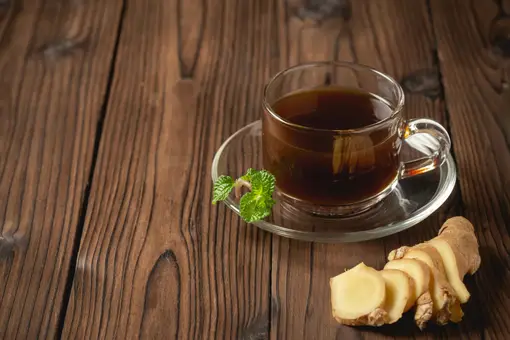
How to include it in your diet?
Beginning your day with ginger tea for breakfast can be a good way to kickstart your digestion. You can add crushed ginger to soups, vegetable curries, or add in a salad. Mix a grated ginger with honey and lemon and consume it to stimulate digestive enzymes in the gut.
7. Garlic
What makes it good for your gut?
Garlic is a powerful prebiotic, which can help good bacteria in the gut to grow and thrive by acting as a food for probiotics. It's a good addition to maintain a balanced gut microbiome and promote smooth digestion. It has additional benefits for the gut by possessing antimicrobial and anti-inflammatory properties which help in fighting off bacterial infections and reduces inflammation in the gut.
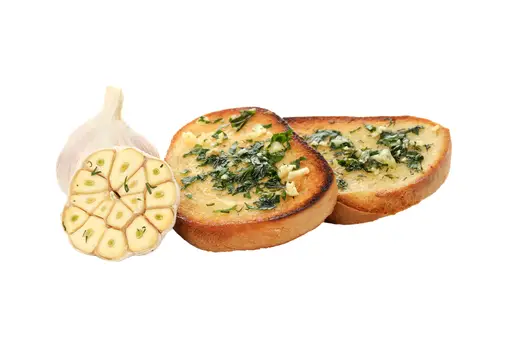
How to include it in your diet?
Garlic is a good flavoring option, mince it and add it to your stir-fried veggies, soups, and sauces. You can also add roasted garlic and spread it on whole wheat bread toast for morning breakfast. Raw garlic is used in hummus preparation and used in salad dressings for prebiotic benefits.
8. Fennel Seeds (Saunf)
What makes it good for your gut?
Fennel seeds are very popular for their stomach discomfort-relieving properties as they are rich in dietary fibers. It helps in promoting regular bowel movements and prevents constipation as well as relaxes digestive tract muscles, relieving bloating and cramping due to antispasmodic effects. It’s a great option to regulate digestion when you have overeaten or dealing with indigestion to get quick relief.
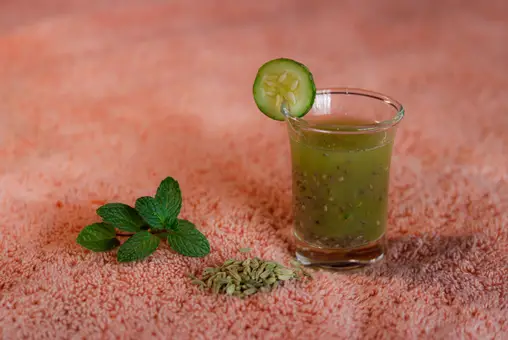
How to include it in your diet?
It is best eaten after a meal as a mouth freshener, which also aids in digestion, or boil it in water for 5-10 minutes, strain the water, and drink in the evening for good digestion. Another good idea is to add fennel seeds in curries and soups for added gut benefits.
9. Cumin Seeds (Jeera)
What makes it good for your gut?
Cumin seeds work by stimulating the production of digestive enzymes, which help break down the food, enhance nutrient absorption, and improve gut health. It is traditionally used for relieving constipation, IBS, abdominal pain, bloating, gas, and indigestion-related symptoms. Additionally, cumin is a time-tested remedy for treating diarrhea and restoring gut comfort naturally.
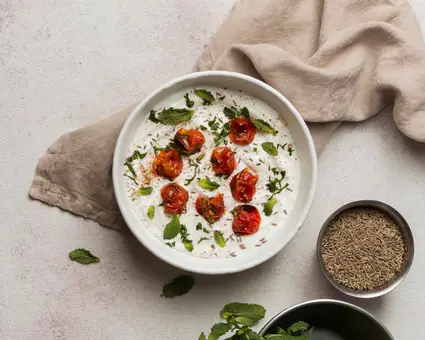
How to include it in your diet?
Jeera water on an empty stomach is best for digestion and gut health and you can prepare it by boiling cumin seeds in water. One good idea is to add roasted jeera powder to buttermilk to make the spiced flavor digestive drink.
10. Mint (Pudina)
What makes it good for your gut?
Mint, a plant, famous for its active compound menthol, with anti-spasmodic properties is a great natural digestive soother. It helps in providing relief from bloating, gas, constipation, and stomach cramps, and speeds up digestion. It stimulates digestive enzymes for the smooth breakdown of food components and nutrient absorption. Mint is also rich in antioxidants, and antibacterial and antiseptic properties to support gut microbiota and prevent infections from mouth to stomach.
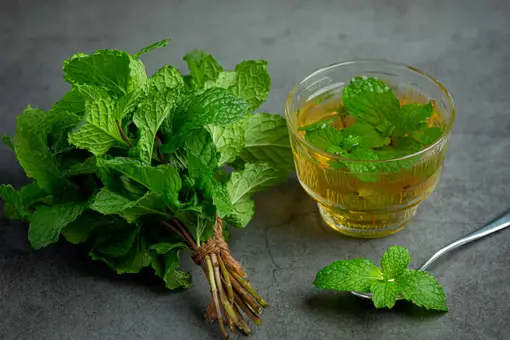
How to include it in your diet?
One of the best uses of mint is as a mouth freshener chewable, used to bring freshness to the mouth and aid digestion. You can also chew fresh leaves of mint for the same purpose or boil it in water and sip on it for the benefits. Another best use of mint is in making chutney with coriander, lemon, and spices. Additionally, you can add chopped mint leaves to salads, lemonades, or detox drinks.
11. Methi Seeds (Fenugreek)
What makes it good for your gut?
Methi or Fenugreek seeds are one of the best sources of dietary soluble fiber, improving digestion and relieving constipation. As a fiber source, working as a laxative, it can help regulate bowel movements and reduce bloating and indigestion. It also supports detoxification and clears out harmful toxins from clean digestion and gut health. For someone experiencing gastric problems, irregular bowel syndrome, stomach cramps, and spasms, fenugreek seeds can help relieve these symptoms. Additionally, fenugreek seeds help improve food digestion, promoting insulin sensitivity, and maintaining blood sugar levels.
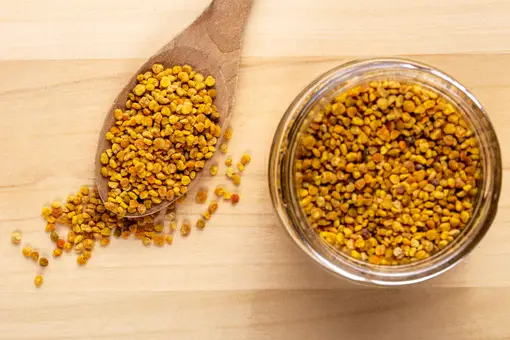
What makes it good for your gut?
The best way can be soaking fenugreek seeds overnight and consuming them first thing in the morning on an empty stomach. You can grind fenugreek seeds, add in the curries, or any spice mix for daal and vegetables.
12. Papaya
What makes it good for your gut?
Papaya is a tropical fruit, rich in “papain”, which is a digestive enzyme that helps break down protein and fibers in the gut for easy nutrient absorption. It is especially beneficial for digesting protein-rich foods smoothly and reduces bloating, constipation, and indigestion. People with digestive discomfort, cramps, gastric issues, and IBS-related issues can consume this fruit and promote their gut health.
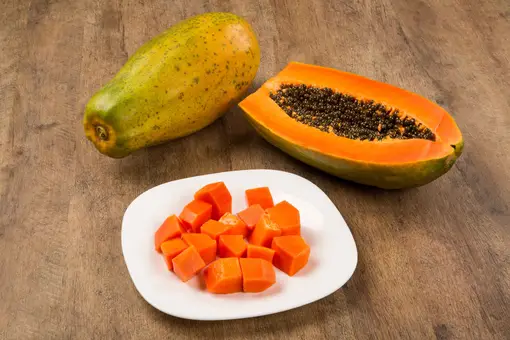
How to include it in your diet?
Papaya is a sweet fruit, you can normally eat in the mid-morning or as an evening snack. You can add the cut pieces of papaya to a smoothie or make a fruit salad. Fresh papaya juice is also a good idea for ease of consumption.
13. Pineapple
What makes it good for your gut?
Pineapple is a sweet and sour fruit, rich in bromelain, which is a digestive enzyme and helps in the breakdown of food components, making the digestion process smooth. Pineapple is rich in vitamin C, antioxidants, and anti-inflammatory properties which help in soothing the irritated and inflamed gut. Moreover, pineapple acts as a prebiotic, feeding the good bacteria and helping them to grow in your gut. This property helps in the flourishing of the probiotics in the gut system and strengthens digestion and immunity.
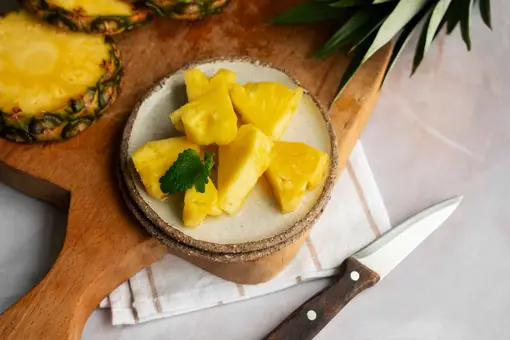
How to include it in your diet?
Pineapple is one such flavor used in every dessert, like ice cream or juice. The best way to eat is to enjoy fresh pineapple slices or add the chunks to a smoothie and salad. You can also make a detox drink using pineapple.
14. Apples
What makes it good for your gut?
Apples contain “pectin”, which is a soluble fiber and acts as a prebiotic for good bacteria in your colon. It is because pectin can not be digested in the small intestine, so it reaches the colon and fuels the good bacteria there to support the gut microbiome. Being a soluble fiber, it also helps in increasing stool volume, making it useful for constipation and diarrhea, and reduces inflammation in the colon.
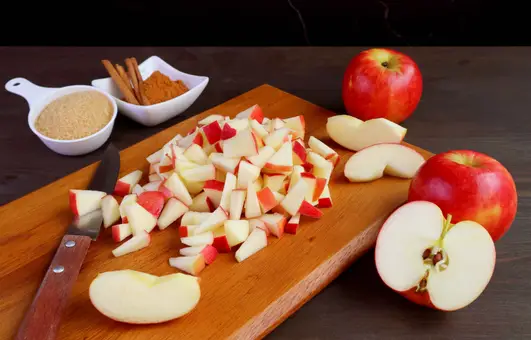
How to include it in your diet?
Just grab an apple whenever you can with the skin for maximum fiber intake. Due to its sweet taste, you can cut it and add it to yogurt, salads, and smoothies. Another best way is to make a chutney or sauce of apple for enhanced flavor and digestion.
15. Chia Seeds
What makes it good for your gut?
One of the popular ingredients these days, whether for detox purposes, weight loss, or maintaining gut health for spotless skin. All this popularity is because of its rich fiber content, which majorly supports healthy digestion. It is soaked overnight, forms a jelly-type structure that helps bind the harmful toxins, and throws them out through regular bowel movements. Chia seeds are also a good prebiotic, feeding good bacteria in your gut and promoting their growth. Fiber content is especially good for promoting regular bowel movements, and the formation of healthy well-formed stools.
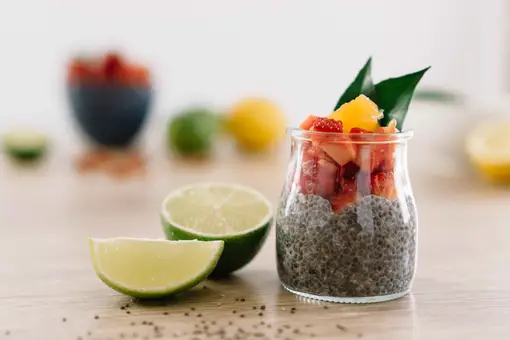
How to include it in your diet?
A detox drink of chia seed is very famous, made using soaked chia seeds and mixed with water or coconut drink. It can be added to smoothies, milk, oatmeals, and yogurts for added texture and fiber.

Health articles from our experts

List of 15 Best Gut-Friendly Foods
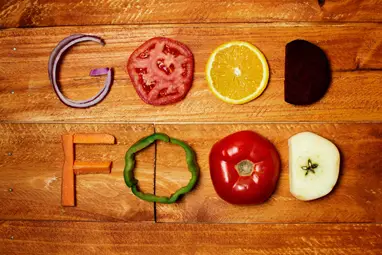
List of 15 Best Foods for Liver Health

A Comprehensive Guide On How To Improve Gut Health

The Power of Probiotics: Nurturing Gut Health for Overall Wellbeing

Digestive Disorders Demystified: Exploring Common Gut Health Issues
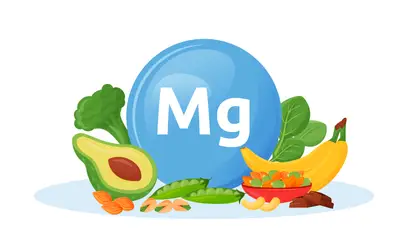
Magnesium for constipation

Simple lifestyle habits to maintain your gut health

Common Indian foods for constipation relief
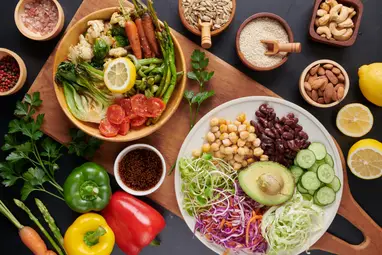
7 Foods that are great for your liver

